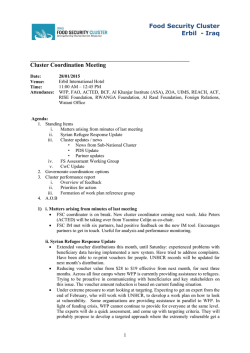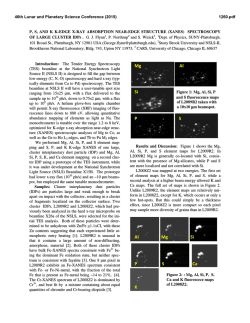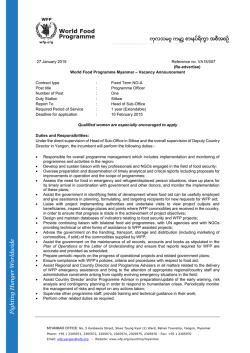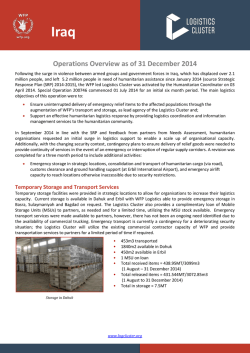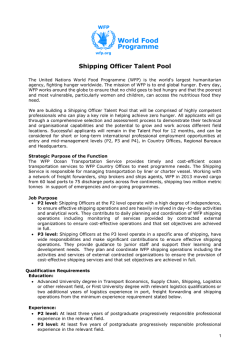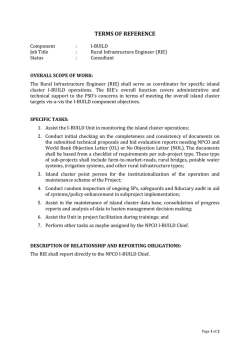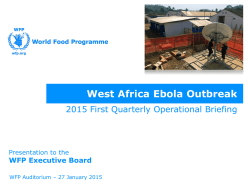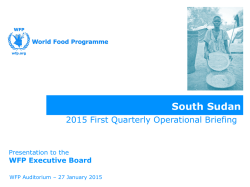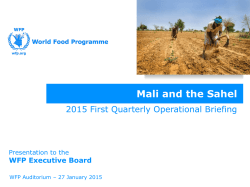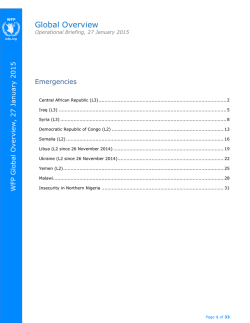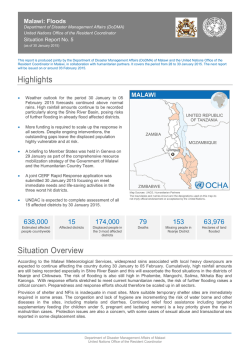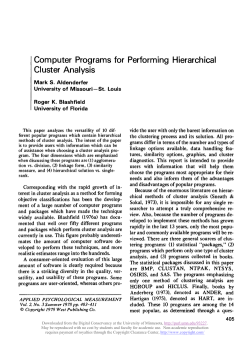
FOOD AND AGRICULTURE ORGANIZATION OF THE UNITED
Food Security Cluster Erbil - Iraq. _____________________________________________________________________ Cluster Coordination Meeting Date: 14/01/2015 Venue: Erbil International Hotel Time: 11:00 AM – 12:45 PM Attendance: - WFP, FAO, ACTED, Al Bashara Charity Association, Iraqi Red Crescent Society, Al Khajae, NPA, Save the Children, World Vision, OCHA, GENCAP, CARITAS, WFP CwC, WHH, UNICEF,ASA, IRW, UIMS, REACH, ACF Agenda: 1. Standing Items i. Matters arising from minutes of last meeting ii. Syrian Refugee Response Update iii. Cluster updates / news • News from Dohuk • PDS Update iv. FS Assessment Working Group v. CwC Update • Community consultations • Two-way communications centre 2. Information management update 3. Governorate coordination: options 4. A.O.B 1) Matters arising from minutes of last meeting Last week was a round-up, so no particular action points recorded. 2) Refugees intervention update: • In December, WFP started voucher operations in Dar al Shakran and Akre camps. • Sunday will see start of vouchers in Kawargosk. • Voucher value revised from USD 31 to USD 28.2 – series of meetings with beneficiaries, refugee councils and other authorities to explain the reasons behind the reduction. Subsequent value reduction will be dependent on the amount of funding received. Resource mobilization continues. • CERF secretariat allocated USD 8 million for refugee response in Iraq – food and protection priority areas according to the working group – await to find out what proportion of the total funding has been designated for the food security cluster. • Qushtapa and ?? camp retailers have been identified so vouchers can be instigated in those camp this year. • Targeting exercises will be discussed with UNHCR, other agencies and relevant authorities. Funding crisis means that targeting is now a priority. Partner participation in this exercise is welcome. • Inter-cluster working group meeting will look at revised contingency plan – steady increase of refugees from Kobani – about 29,000 so far in KRI. About 20% remain in camps, but all are initially received in the camps. SC and BCF provided initial assistance before the new arrivals and this could be integrated into WFP and UNHCR distributions. Both have exhausted their funds, so WFP is asking again other partners who could step in and provide this emergency assistance on arrival. Will confirm 75,000 people planning figure on Thursday. 1 3) Cluster updates/news • National information management officer starting in Duhok. This will allow expansion of localised services, in other areas such as Sulaymaniyah. Awaiting feedback report from global cluster, which will feedback into a cluster work plan. A working group will be held to refine and develop this in line with partner needs. Riccardo Suppo will be heading the FSC, in February in absence of Cluster Coordinator Barb Wigley. News from Duhok: On 13 January a special meeting hosted by FSC in Dekan, was held in response to disruption in distributions and to discuss contingency planning for returns to that area. Feedback on pilot training for gender protection: Inter-agency GENCAP advisor and FSC undertook a joint mission in December to analyse Safe Distribution in Duhok – targeted support provided for some gaps noted. o Based on the recommendations one day pilot was implemented with partners in Duhok on SAfe Distribution for Food Assistance Checklits developed by the Iraq Food Security Cluster. This one day pilot training & consultation was held on Jan 13, 2015 in Dohuk. 3 FSC partners were invited to this training/consultation. The module focussed on safe distributions (FSC developed), looked at key reference documents, agreed on common definitions, analysed gender and protection matters, which was then applied to the safe distribution check-list-what is being implemented, challenges and support needed. o The teams are aware what the specific needs are without the list, but they were not aware of the list. They identified separate entrance and exit points, male and female staff, discussion with men and women separately – some of the challenges that they were finding difficult to implement. o Voucher/cash distributions happen in centre of cities, may not be equally accessible – FSC might be able to advocate for better locations whose paramters also comply with some of the physical needs of equal /safe access such a toilets, shades etc. o Partners suggested prioritising some items on the list. Asked for a guidance note on how to communicate with the communities – training or a document. They would prefer a longer training, perhaps at end of a month. Communications session should be included. Encourage organisations to ensure gender balance. Cluster partners could share their experiences at cluster meetings, perhaps once a month. o GENCAP adviser will prepare two-page report to be handed to the cluster coordinator. o Action point: Translation of Safe Distribution Checklist into Kurdish and Arabic. PDS update: WFP consultant John Schnittker is analysing the GoI’s achievements in supplying basic commodities into PDS, documenting performance in tendering, and following commodities through the system. Looking at efficiency and equity of distribution. Working with ministry of trade, grain board, state foodstuffs company. Iraq has made large purchases of wheat and rice in the last 2 months. That should soon be in warehouses and moving out to people soon. WFP update: challenges on supplies being received from Turkey – for January, WFP is targeting 1.3 million people. IRW: distributions of food and hygiene kits for IDPs and refugees ongoing in Duhok. 4,000 parcels for refugees in Duhok and Erbil. Assessments with FAO in Anbar, and UNFPA. Distribution planned with FAO Save: distributing 18,000 vouchers with WFP ASA: Distributed NFIs to remote snow-affected areas in north, reached 500 families. Planning a food coupon for people in Fallujah and Hit. World Vision: started January distributions on 13 January in Erbil. To manage the issue of beneficiary duplications, WV used new LMMS technology to give beneficiaries a registration card to be used for any type of assistance. WV also offering orientation to WFP and other partners, for their information. WHH: 14 trucks crossing in from Turkey going to Kirkuk, 4 to Duhok. Food parcels being distributed with Turkish Red Crescent. 2 NPA: distributing winterisation supplies in Erbil, Duhok, Suly, Salah al Din and Diyala, plus working on C&V for 3,000 families – USD-100 proposed per household. Have criteria for finding most vulnerable people. Will coordinate with FSC to find gaps and to avoid duplication. And no overlap has been identified. Al Bashara Charity: working from Halabja and Zakho, covering all the cities in Kurdistan, assisting displaced people. Hoping to assist Syrian refugees also. They have been able to help the IDPs from Mosul, Ninewa and Anbar since December, those living in rented houses outside Erbil in particular, if they haven’t been assisted by other organisations. They invite other organisations to assist with work in Ainkawa. FAO: Cash for Work programme targeting 5,000 people. Just finished 2,000 in Diyala, remaining 3,000 in Erbil, Duhok and Ninewa starting next week. Remaining money to be spent on fertiliser not wheat seeds. Governemt requested further vaccination programming. Vegetable seeds and agricultural tools to be distributed by IRW. Last week finished distribution of chickens and feed, to provide eggs. FS assessment in Anbar completed, results coming back. About to start in Kirkuk, Baghdad and Salah al-Din – ongoing finalisation with WFP. Animal feed programme is on hold until feedback received from governor of Ninewa on targeting people returning to Sinjar. Caritas: unconditional cash programme in Zakho and Duhok. USD 150 per family. Smaller families get USD 36 per person. 2,214 families assisted both in Mangeshk and Amedi. 4) CwC updates Phyza Jameel has joined WFP to work on CwC. Syeda Zahra completed consultations in Erbil city. Assessments have shown need for increased CwC engagement from agencies. Consultations primarily designed to elicit feedback which will improve service delivery, and to increase a sense of ownership within the community. Feedback has been very useful to WFP and partners. Inter-agency call centre project arises from community demand – complaint mechanism as well as service delivery. Software has been created: WFP, UNHCR, IOM, NRC and World Vision are all partnering; UNFPA will provide two operators for gender and protection issues. Designing information gathering platforms for agencies. Operators must be well-versed in programmatic information. A steering committee is ensuring the efficacy of the FAQs being gathered by the clusters. Phyza offers technical backstopping for CwC to all partners, and asks for feedback. 5) Education cluster update Education cluster coordinator briefed partners on issues regarding education for IDPs and refugees. Not all refugee children have been reached (around 57,000 children). Trying to reach all through partners (KRG takes primary responsibility for refugees, GoI for IDPs). Cluster trying to look into exactly what is happening, and what are the key strategies. Planning figures: children from 4 to 17 number 609,000. Basic education for 6-17 is compulsory, 4-5 is considered pre-primary. About 50% across region are young people, 18 or below. Governments brought together by UN. Strategies: 1) Shift IDPs out of schools. 2) Use caravans as schools. 3) Rent buildings to use as schools and renovate schools that were used as shelters. However, there are still 500 schools being used as shelters, and 130 being used by the military. The academic year has been badly disrupted, and many children will not attend school this year. 18 partners in cluster, working in IDP and refugee response. Only 10 percent of USD154 million planned has been funded. Schools are being overstretched by influx of IDPs. Non-camp locations of Syrian refugees are a big problem, as is language – most have not been reached. Struggling to get funding. 3 Once food and shelter requirements are met, parents can focus on securing education for their children. 6) Food Security Information Management Tool update A first output of the Information Management Tool was produced and presented, with sample data to show what the tool can do in terms of monitoring the FS sector response. Two maps were shown: areas where food distribution took place, detailing how many beneficiaries were reached per district; and reached versus the planned, that gives an alternative perspective on the data, and allows monitoring of cluster partner performance, as well as gaps in assistance. IM officer will contact partners on a bilateral basis to establish protocol for monthly information sharing. The information could be overlap with DTM information to see who is being reached and where. NEXT MEETING: Wednesday 28 January 2015, 11:00 a.m. – Venue to be determined 4
© Copyright 2026
